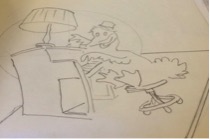This is Where the Magic Happens

This is an original sketch for the piano playing chicken. Courtesy of the Cummings Center for the History of Psychology.
One of the many fascinating collections housed in the Cummings Center for the History of Psychology is the IQ Zoo. Created by psychologists Marian Bailey and Keller Breland, and later co-operated by Bob Bailey, the IQ Zoo grew from an idea in the lab to a legitimate business. They saw the possibilities for marketing operant conditioning and took their chance at creating a circus type-environment where children and parents of all ages could gather around and watch the many talents of chickens, ducks, raccoons, and more.
These psychologists hypothesized that visitors to the IQ Zoo could be so amazed with the tricks these animals performed that they would develop a new sense of encouragement to impact their own lives. If a chicken can learn to play a piano, then maybe I can quit smoking, learn Spanish, or stop eating sweets.
The 1950’s was a time of great progress in psychological science, producing studies that every student learns about in General Psychology (e.g., Asch’s Conformity experiment, Harlow’s Monkey experiment, and the Robbers Cave experiment). The IQ Zoo is one of those experiments because no other psychologists had previously exposed their work through marketing. It was available to parents, children and teachers of Hot Springs, Arkansas.
The purpose of the IQ Zoo was to convince people that operant conditioning was an effective treatment for teaching new behaviors. Operant conditioning is using rewards to change behavior. Some of these specific behavioral techniques are positive reinforcement and errorless teaching, which allow animals to learn in a very natural environment without demerits or punishment. This was more than just animals that were trained to do elaborate tricks. They could have just written an article about their hypothesis, but they were aiming to appeal to a wider population than simply psychologists.

This was an updated version of the piano playing duck in an advertising magazine. Courtesy of the Cummings Center for the History of Psychology.
One of the apparatuses used was a piano playing chicken. Originally, the instructions were written for a duck, but they decided both animals could successfully complete the task. A child would insert a coin into the side of the piano, which would prompt the chicken to peck a light switch and start playing the piano for the time necessary until he received a reward (food).

This is the apparatus of the chicken playing the piano described in the paragraph above. Courtesy of the Cummings Center for the History of Psychology.
Psychology is a brilliant way to demonstrate how people and animals learn. The IQ Zoo will remain an influential part of the history of psychology because it promoted the field to go beyond the books and into the real world.
The links below provide extensive information about the IQ Zoo.